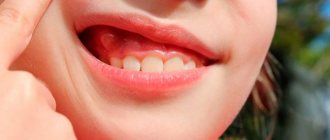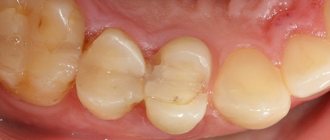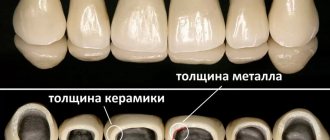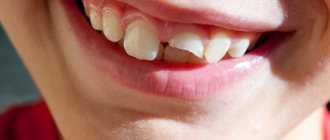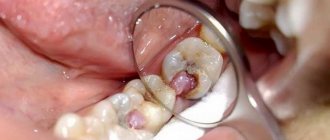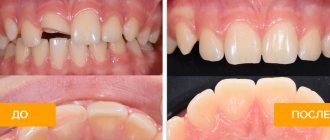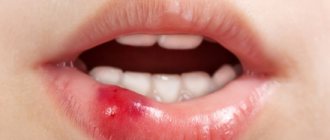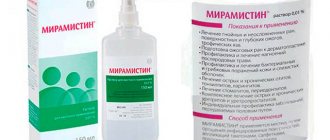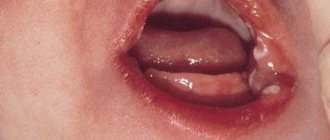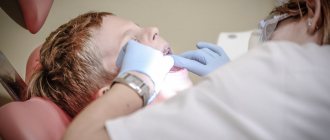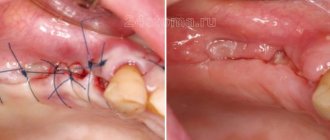At what age is the risk of swallowing a tooth high?
A tooth can fall out and be swallowed as a result of injury, such as an impact from a fall. In such a situation, complete dislocation is possible, when all periodontal fibers are torn and the tooth loses connection with the socket. However, such cases are rare. Most children swallow baby teeth that fall out before the permanent teeth appear. The roots of temporary teeth gradually dissolve, and they fall out painlessly, sometimes even unnoticed. The child swallows them just as unnoticed. This often happens during eating, when the chewing force separates the loose tooth from the gum, and along with a lump of food it is sent into the esophagus.
The most likely age for swallowing a tooth is the period of change from a temporary bite to a permanent one. Each group of teeth changes at a certain age:
- change of central incisors - 5–9 years;
- change of lateral incisors - 7–10 years;
- change of first premolars - 9–13 years;
- change of second premolars - 9–14 years;
- change of fangs - 9–14 years.
Moreover, even such approximate dates are not always observed: they can be influenced by diseases suffered in childhood, nutritional patterns, water quality, and climatic conditions [1, 2].
It should be remembered that the timing of the eruption of both primary and permanent teeth may vary.
A deviation in one direction or another within 6 months is considered normal for a particular child. Vinogradova T. F., Doctor of Medical Sciences, Professor [2]
What can be done and what should not be done?
It is difficult for the victim himself to assess how deeply the tooth has sunk. Independent attempts to remove it from the esophagus will lead to a gag reflex and, possibly, new damage to the oral cavity.
What not to do:
- Trying to reach the tooth with your fingers and especially with foreign objects
- Panic and try to “cough up” the interfering object
- Do nothing and hush up the problem, expecting it to go away on its own
Examine the gums if possible. If a tooth has fallen out or crumbled, then you should know what condition it was in in the near future. A small analysis will help you understand how big the chip is now in your throat; careful palpation of the gums from below will help you determine whether the root remains inside.
If there is no sensation of pain in the larynx or esophagus, then the natural way of exiting the swallowed tooth is most likely and there is no reason for concern
With all this information, go to your dentist or immediately to a traumatologist if you have difficulty breathing. The specialist will tell you what to do now, and at the same time will diagnose other teeth, warning of possible danger.
Is it dangerous if a child swallows a baby tooth?
The likelihood of swallowing baby teeth is quite high, but such cases do not pose a health hazard. Like other small foreign bodies that have entered the esophagus, the tooth will be removed from the body naturally after passing through the digestive tract. The roots of such teeth have already resolved, all edges are smoothed, and they cannot injure the mucous membranes [4]. Teeth also do not contain substances hazardous to health, and they do not have a toxic effect on the stomach or intestines.
Dentists recommend not to interfere with the natural physiological processes of the body. You should not give a laxative or especially try to induce vomiting: it can cause the tooth to be inhaled into the lungs [5]. And the most important rule is not to panic and not to fuss. A stressful state will inevitably be passed on to the child and harm him more than a swallowed tooth.
Why did the crown fall off?
Most often, the process of swallowing is invisible; a person understands this only after finishing the meal and the absence of an artificial tooth. Usually the cause is the consumption of solid foods, for example, the process of chewing tough meat. If the problem occurs shortly after dental prosthetics, the reason is poor-quality installation and unreliable fixation of the crown. The second option is that the crown fell off after a long time. Most likely, the prosthesis has expired, so the artificial material could not withstand the next load.
First aid for a child if he has swallowed a tooth
The first step is to calm the child down and explain to him that nothing bad happened. This is especially true if the wound is bleeding, since many children are afraid of blood and may consider it a sign of danger. Next you should tackle the hole:
- Biting on a cotton swab for 5–10 minutes helps stop the bleeding. If the bleeding does not stop, you should consult a doctor.
- To disinfect the hole, you can rinse with saline solution or chamomile infusion. It is not allowed to use strong antiseptic and anti-inflammatory drugs without the recommendation of a dentist.
- For healing to occur, the hole needs to be kept at rest: do not eat anything and try not to drink for two hours. Until the next day, it is better to avoid irritating foods: hot, sour, spicy [3, 6].
To facilitate the passage of the tooth through the digestive system, it is worth limiting activity. After the two-hour break in food is over, offer your child raw vegetables, fruits, and whole grains - they will help the tooth move [5].
Typically, it takes 12–14 hours for a tooth to pass through the gastrointestinal tract. If you want to control its output, you can give your child some corn kernels. They leave the intestines unchanged, and their presence in the stool will be a signal that the tooth has also left the body [5].
Dentist appointment
Now let's move on to the question of the aesthetics of a smile. Even if the crown has not completely fallen off, it still needs to be replaced with a new one. We advise you to contact a trusted dentist to ensure that the prosthesis is securely fixed. For maximum reliability, we recommend giving preference to higher quality materials, such as ceramics or cermets. Plastic is a budget option, but the service life and reliability of fastening leave much to be desired.
To prevent such situations, we recommend visiting the dentist every six months. In this case, there is a chance that the doctor will promptly notice the unreliable fixation of the artificial tooth and prevent further problems. Also pay attention to the service life of the crown. If it is designed for 5 years, after the period has passed, you need to see a specialist and take an impression to make a new prosthesis.
When to worry
Lost teeth in the digestive tract are harmless. However, in very rare cases, swallowed small objects, including teeth, may enter the respiratory tract instead of the esophagus. This situation carries serious risks and may require emergency medical attention. To rule it out, monitor your child after swallowing a tooth. You should be alert to the following signs:
- difficulty swallowing;
- increased salivation;
- cough or wheezing;
- neck or chest pain;
- nausea and vomiting;
- blood in vomit or stool;
- abdominal pain;
- heat.
Any of these symptoms is a reason to immediately consult a doctor [7].
Why did the child develop caries, after all, he brushes his teeth every day?
No matter how independent a child is, until the age of six he cannot brush his teeth on his own, because at this age fine motor skills and coordination are not sufficiently developed. Try to remember how difficult it is for preschool children and even first-graders to write sticks, circles and letters in copybooks. Therefore, parents should help children under 6 years of age to brush and floss.
Carious lesion is a multifactorial disease, its occurrence and severity depend on the local immunity of the oral cavity, the structure of tooth enamel, diet, saliva composition and level of hygiene. To be able to assess the risk of developing caries and try to reduce its intensity, you need to regularly (preferably once a quarter) go to the pediatric dentist. The doctor will select the necessary procedures (therapeutic and preventive) depending on the specific case and will correct them at regular examinations.
Preventive measures
To reduce the risk of swallowing, ask your child to report loose teeth immediately. Then you can monitor the process of loosening and intervene if necessary. If at least one milk tooth is mobile, every time before eating it is worth reminding the child to be careful and try not to bite or chew with this tooth.
It would also be a good idea to take measures to prevent impacts that could lead to teeth being swallowed. Active play of young children should be supervised and they should be provided with high-quality equipment for sports: masks, helmets, and mouthguards.
Is it possible to do without visiting a doctor?
It is possible if no discomfort is felt. Tooth enamel and the “body” of the tooth do not pose any threat even if they are damaged by caries. The body will easily tolerate this and “pass” a foreign object through the gastrointestinal tract without damage.
The closest analogy is to imagine that you swallowed a cherry pit.
A swallowed crown or filling is still worth a visit to the doctor in any case. This way you can prevent further destruction and not endanger neighboring healthy teeth.
Should I worry?
Panic attacks are inappropriate here, because the unit could be very unsteady. Therefore, during meals, when children put pressure on the organs, they often fall out. Mothers are worried that they will damage the baby’s internal organs. Dentists say that when a child swallows a tooth, it is not dangerous for him. The structure of temporary crowns is fragile and soft. Therefore, when the baby ate a tooth:
- Parents should take this calmly.
- Mothers should feed their child a hearty breakfast or lunch.
- Don't miss your baby's potty trip.
- Check to see if there is a tooth in the pot.
Mothers calm down when “the missing item is found.” True, this does not always happen. There may be no crown in the pot. Where is she? Milk organs are not durable. If there is a calcium deficiency in the body, the chewing organ could be digested. In this case, the body has replenished the deficiency of a useful mineral. The next day you need to take tests to determine the amount of calcium in the body. Contact your pediatrician, he will assess the situation and prescribe therapy.
The child swallowed a lost baby tooth, which means that a bleeding wound could have formed at the site of growth. First of all:
- Have your baby rinse his mouth with an antiseptic solution without alcohol or clean water.
- Blood can be removed from the wound if the child bites on a gauze swab.
- After this, do not feed the little one for 40-50 minutes. Don't give him hot or spicy food for a while.
- If the baby has experienced a fright, calm the child down, be kind and gentle with him. Explain to your child that it is safe.
It is important that parents do not make a tragedy out of this event. Approach this issue with optimism. Most children are afraid to pull out loose crowns, but they constantly touch them with their hands and tongue. It is important that the child does not choke when the “pearl” comes off.
Waiting for the tooth fairy
The most popular tradition in the modern world is the tale of the tooth fairy. This tradition began in Iceland, but gradually it spread to America, and then it was adopted by almost the whole world. This transition occurred thanks to the cartoons that children watch.
According to tradition, when a baby loses a baby tooth, he should put it under the pillow, and when the child falls asleep, a little fairy with wings flies to him. With a wave of her magic wand, she takes out a tooth from under the pillow, and in its place puts a coin or sweets. This is the fairy tale that modern children believe.
If a tooth was removed at a dental clinic, then parents can confidently ask the dentist to give the tooth back so as not to upset the child, and also put it under the pillow at night.
Parents who do not believe in omens requiring burning, burying or any other actions with baby teeth can, after “magically” replacing the tooth with sweets or money, wrap the tooth in a napkin and dispose of it in the usual way. Whatever decision is made, it is important to preserve the child’s faith in magic and the importance of the events taking place.
What to do in the first minutes
When you notice that a tooth is missing, it is necessary to provide first aid to the child. To do this, ask him to rinse his mouth with boiled water. Then give the baby a gauze pad, let him bite it, this will remove the blood from the hole. Do not let your child eat for an hour. After another hour, the baby should refrain from spicy and hot foods.
And most importantly, if you see that a child has swallowed a tooth while sleeping or eating, do not panic, parents’ fear is easily transmitted to children. Be calm and don't highlight this as a tragic event. Take this situation with optimism. Let this be a family story about how your entire family searched for lost fangs in a pot.
Do I need to restore a broken or lost tooth?
Dentists at the DentoSpas clinic do not recommend leaving gaps in the dentition. It is better to plan and perform restoration, implantation or prosthetics as quickly as possible. Without treatment, bone tissue atrophy will begin, the load on adjacent crowns will increase, and the chewing load will begin to be distributed unevenly. This will lead to displacement of neighboring teeth and may cause their loss. If left untreated, a broken or chipped crown will continue to deteriorate and repair will become impossible. With advanced caries, periodontal disease, and periodontitis after tooth loss, the disease does not go away on its own; it continues to develop until complete edentia.
Are there medications that will improve the situation?
There are no solutions aimed at solving this specific problem. Such medications are not sold because the problem is not significant and will soon resolve itself or with minimal help from doctors.
Under no circumstances should you use drugs that artificially speed up digestion - this will cause no less harm to the body than vomiting.
Dehydration, stopping the healthy digestive process, pain, loss of appetite - all these symptoms can appear if you take the drug without appropriate indications.
If the tooth is severely stuck and scratched, no medications will help - go to the emergency room, where foreign objects are pulled out of the esophagus every day. This can only be done by a professional physician who knows how the esophagus works and will not damage it. If you don’t want to wait in line at the clinic and search for the right office, you can find a private dental office - usually there is at least one of these in every area.
Binge eating
This mistake is made by people who are not familiar with the structure of the digestive system. The only option when this solution can be partially correct is that the tooth is stuck at the end of the esophagus and you feel it somewhere above the stomach.
You can eat a small piece of black bread (white is more sticky), fruit or vegetable (preferably with a dense consistency). If after this the sensations do not change in any way, try again in half an hour. You can drink water.
Important! Feelings can be distorted by worry and anxiety - there have been cases when people, frightened by far-fetched threats, feel pressure and scratches from within that are not there. You can check your condition with a moderate sip of water.
In addition, a swallowed crown or other metal element of dental corrective structures will not be visible on an x-ray due to the large amount of food in the stomach and waste in the intestines.
